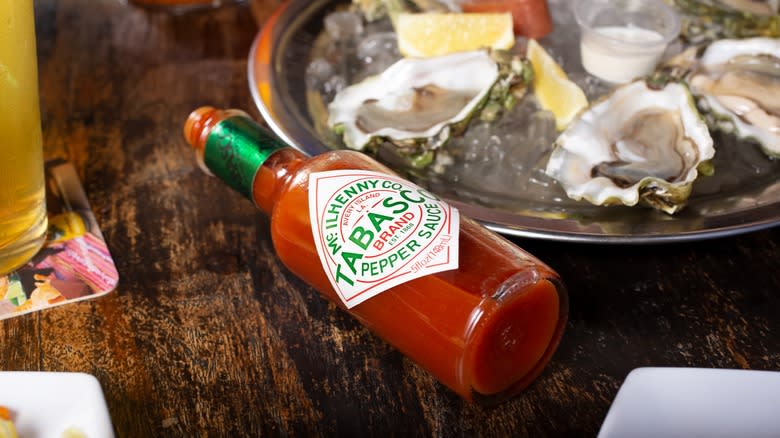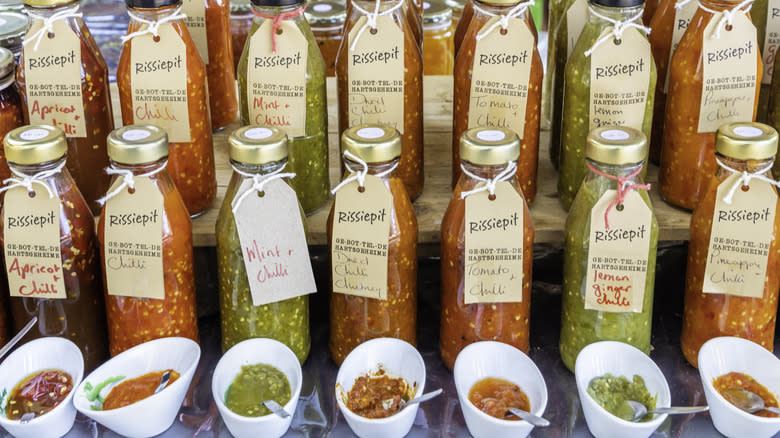Storing Hot Sauce In The Fridge Isn't Always Necessary

Hot sauce distinctively stands in a class of its own when it comes to condiments, providing an array of delectable flavors -- if you can handle the heat! Some hot sauces are celebrated for being quite mild, while others have a reputation for being so hot they could easily compel the devil himself to dance. When it comes to preserving these sauces, you'll want to take every step you can to make sure they maintain both their quality of flavor and level of heat.
Likewise, this prompts the question: Where is the best place to store your bottle of hot sauce after it's been opened? Many people say it's the refrigerator, which would be a very common sense choice. However, a more accurate answer is that it's not necessary, depending on the brand. If your hot sauce is high in acidic ingredients, like vinegar, you can safely keep it in the cupboard. If not, you should consider storing it in the refrigerator.
Read more: The 15 Best Store-Bought Barbecue Sauces, Ranked
Hot Sauce Storage: The Fridge Vs. The Cabinet

Most brands of hot sauces are usually kept on the shelves at supermarkets and grocery stores. Once you take one home and use a little (or a lot) on your food, you may wonder whether it should go into the fridge or in the cabinet. Tamika Sims, senior director of food technology communications at the International Food Information Council, tells Martha Stewart that the label on your bottle will usually let you know if refrigeration is needed. If there are no storage instructions on the label, "it is likely that refrigeration is not needed," says Sims. Christian Brown, the agriculture manager of the Mcllhenny Company, tells Allrecipes that storing an opened bottle of Tabasco in the fridge isn't needed, but doing so will slow down the process of discoloration.
Brown recommends storing Tabasco in a dark, cool, and dry location. Like salt, vinegar can help rid your sauce of microbial growth. Vinegar happens to be the acidic ingredient in Tabasco (and most hot sauces) that helps with preservation. So, no refrigeration is needed. But what about other hot sauces, like sriracha? If you were lucky enough to buy some during the sriracha shortage, the same rule applies. According to the leading sriracha manufacturer Huy Fong (via Allrecipes), sriracha's highly acidic chili peppers and vinegar will keep it from spoiling when placed in a cabinet at room temperature.
What About Hot Sauces That Are Less Acidic?

While hot sauces such as Tabasco and sriracha boast enough acidity to be safely stored at room temperature after opening, there are other sauces where taking such a chance might not be advisable. Tracey Brigman, associate director of the National Center for Home Food Preservation, tells Epicurious that "hot sauces with mango, pineapple, or some other fruit as their main ingredients may not be acidic enough to be kept at room temperature." Brigman notes that hot sauces either high in oil concentration or lacking vinegar as the main ingredient should be refrigerated.
Brigman also says that hot sauce kept at room temperature may also have some explosive qualities, and she's not talking about its spice. If you store an opened bottle of fermented hot sauce in a cabinet, it will keep on fermenting at room temperature, which may cause the bottle to burst! Fermented hot sauces should always be kept in the fridge unless they've been pasteurized or contain a high concentration of vinegar. So, there you have it, folks. Read the labels and check the ingredients before deciding how you store your hot sauce.
Read the original article on Daily Meal.

